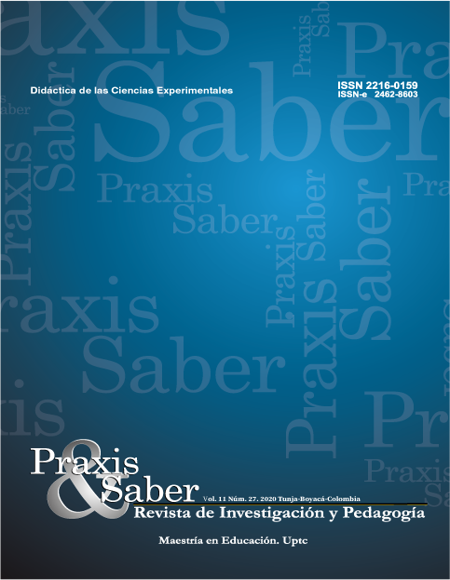Teaching pedagogical performance and learning of university students in the Education career

Abstract
The main objective of the study was to determine the connection between teaching performance and the learning of students of the majors in Early Education and Primary Education, during the second semester of 2016, who joined to the Faculty of Education and Social Sciences of the National University of Ucayali-Pucallpa in 2014. The research design was non-experimental, transversal, and correlational-descriptive. The sample consisted of 94 students of the two programs. Two instruments were applied. The first one helped to measure the teacher performance, which was divided into four dimensions—teachingtutoring, teaching-learning process, research, and university extension-social projection—segmented in 27 items with a Likert type scale. The second instrument was used for measuring the learning, which was divided into three dimensions—superficial perspective, deep perspective, and high-performance perspective— segmented in 33 items with a Likert type scale. The conclusion was that there is a high degree of correlation between teacher performance and student learning, thus inferring that teacher performance positively influences learning.
Keywords
education, learning process, performance, university student, teaching
References
Acosta, S. (2017). Desempeño docente y aprendizaje de matemáticas en los estudiantes de
cuarto grado (tesis de maestría), Universidad César Vallejo, Lima Perú.
Álamo del, J. (2015). Relación entre desempeño docente y nivel del logro de aprendizaje de
los oficiales alumnos de la maestría en ciencias militares de la Escuela Superior de Guerra
Del Ejército - 2014 (Tesis de maestría). Universidad Nacional de Educación Enrique
Guzmán y Valle. Lima-Perú
Basto, R. (2017). La función docente y el rendimiento académico: una aportación al estado del
conocimiento. XIV Congreso Nacional de Investigación Educativa – COMIE. San Luis
de Potosí, México.
Bazar, D., & Kraft, M. (2017). Teacher and Teaching Effects on Students’ Attitudes and
Behaviors. Educational Evaluation and Policy Analysis, 39(1), 146-170. https://doi.
org/10.3102/0162373716670260
Cortés, E., Campos, M., & Moreno, M. (2014). Priorización de las dimensiones de
evaluación al desempeño docente por el estudiante, en tres áreas del conocimiento.
Formación Universitaria, 7(2), 3-10. https://scielo.conicyt.cl/scielo.php?script=sci_
arttext&pid=S0718-50062014000200002
Díaz, A., & Pérez, M. (2013). Autoeficacia, enfoque de aprendizaje profundo y estrategias
de aprendizaje. International Journal of Developmental and Educational Psychology, 2(1),
341-346. https://www.redalyc.org/pdf/3498/349852173023.pdf
Duckworth, A., Quinn, P., & Tsukayama, E. (2012). What No Child Left Behind leaves
behind: The roles of IQ and self-control in predicting standardized achievement test
scores and report card grades. Journal of Educational Psychology, 104(2), 439-451.
https://www.ncbi.nlm.nih.gov/pmc/articles/PMC3782117/
Fasce, E. (2007). Aprendizaje profundo y superficial. Revista de Educación en Ciencias de la
Salud, 4(1), 7-8. http://www.udec.cl/ofem/recs/anteriores/vol412007/esq41.pdf
Freire, P., & Faundez, A. (2013). Por una pedagogía de la pregunta. Crítica a una educación
basada en respuestas a preguntas inexistentes. Siglo XXI.
Gálvez, E., & Milla, R. (2018). Evaluación del desempeño docente: Preparación para el
aprendizaje de los estudiantes en el Marco de Buen Desempeño Docente. Propósitos y
Representaciones, 6(2), 407-452. https://doi.org/10.20511/pyr2018.v6n2.236
Gómez, V., Rosales, S., García, J., & Berrones, K. (2011). Correlación entre la práctica
docente y rendimiento académico en un grupo de estudiantes de medicina. Archivos en
Medicina Familiar, 13(3), 117-121.
Hopkins, W. (2014). A New View of Statistics. https://complementarytraining.net/wpcontent/
uploads/2013/10/Will-Hopkins-A-New-View-of-Statistics.pdf
Instituto Nacional de Estadística e Informática. (2014). Encuesta nacional a egresados
universitarios y universidades. https://www.inei.gob.pe/media/MenuRecursivo/
publicaciones_digitales/Est/Lib1298/Libro.pdf
Martínez-Chairez, G., Guevara-Araiza, A., & Valles-Ornelas, M. (2016). El desempeño
docente y la calidad educativa. Ra Ximhai, 12(6), 123-134.
Ministerio de Educación del Perú. (2015). Rutas de Aprendizaje Perú. http://www.minedu.
gob.pe/rutas-delaprendizaje/documentos/Primaria/Matematica-III.pdf
Monroy, M. (2012). Desempeño docente y rendimiento académico en matemática de
los alumnos de una institución educativa de Ventanilla – Callao (Tesis de maestría).
Universidad San Ignacio de Loyola. Lima, Perú.
Muñoz, E., & Gómez, J. (2005). Enfoques de aprendizaje y rendimiento académico de los
estudiantes universitarios. Revista de Investigación Educativa, 23(2), 417-432.
Palomino, F. (2012). El desempeño docente y el aprendizaje de los estudiantes de la Unidad
Académica de Estudios Generales de la Universidad de San Martín de Porres (Tesis de
maestría). Universidad Nacional Mayor de San Marcos. Lima, Perú.
Quién es quién. Walter Andrew Shewhart (1891 Illinois, EEUU - 1967 Nueva Jersey, EEUU).(2014). Revista Índice. http://www.revistaindice.com/numero58/p2.pdf
Rahmatullah, M. (2016). The Relationship between Learning Effectiveness, Teacher Competence and Teachers Performance Madrasah Tsanawiyah at Serang, Banten, Indonesia. Higher Education Studies, 6(1), 169-181. https://doi.org/10.5539/hes.v6n1p169
Rueda, M. (2009). La evaluación del desempeño docente: consideraciones desde el enfoque
por competencias. Revista Electrónica de Investigación Educativa, 11(22). http://redie.
uabc.mx/vol11no2/contenido-rueda3.html
Santos del Real, A. (2012). Evaluación Docente. Educación Química, 23 (2), 200-204. http://dx.doi.org/10.1016/S0187-893X(17)30109-X
Soler, M., Cárdenas, F., & Hernández-Piña, F. (2018). Enfoques de enseñanza y enfoques
de aprendizaje: perspectivas teóricas promisorias para el desarrollo de investigaciones
en educación en ciencias. Ciência & Educação (Bauru), 24(4), 993-1012. https://doi.
org/10.1590/1516-731320180040012
Soler-Contreras, M., Cárdenas-Salgado, F., Hernández-Pina, F., & Monroy-Hernández, F.
(2017). Enfoques de aprendizaje y enfoques de enseñanza: origen y evolución. Educación
y Educadores, 20(1), 65-88. https://doi.org/10.5294/edu.2017.20.1.4
Usun, S. (2004). Important learning dimensions influencing undergraduate students
learning and academic achievement in higher education. The Turkish Online Journal
of Educational Technology – TOJET, 3(4), 15-27. https://files.eric.ed.gov/fulltext/
EJ1101914.pdf
